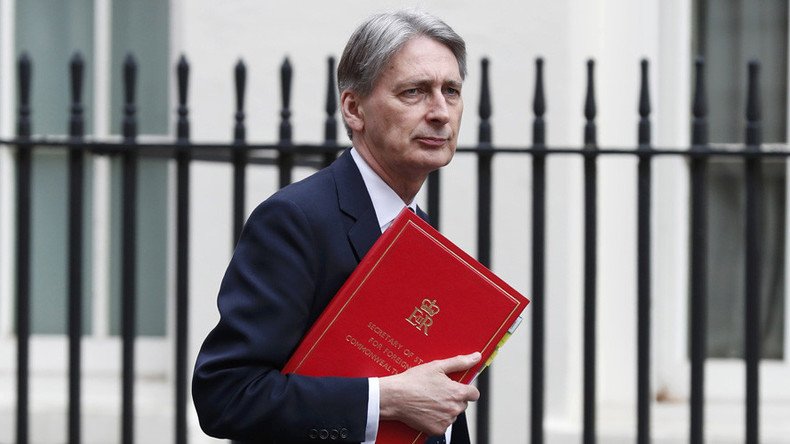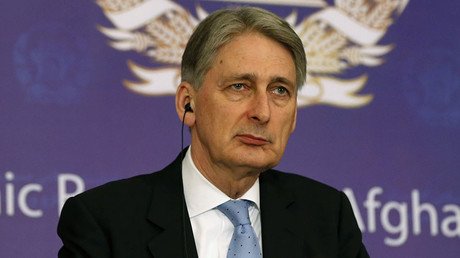Philip Hammond has a funny way of showing his commitment to ‘international norms’

Gone are the good ol’ days when Russia was only a ‘threat’ to countries on its periphery. Moscow now represents a threat to “all of us” according to British Foreign Secretary Philip Hammond.
Speaking to Reuters during a trip to Georgia, Hammond said Russia was a threat to all countries on the basis that it “ignores the norms of international conduct and breaks the rules of the international system” — and this, he said “represents a challenge and a threat to all of us.”
The first, but most minor point to make here is that Russia’s allies would probably beg to differ. Hammond’s comments are a prime example of the flippant way in which leaders and representatives of Western nations make sweeping statements about “us all” or the “international community” when what they actually mean is “us and our friends.”
But, like I said, that is a minor issue in comparison to the outrageously hypocritical reasoning Hammond gave to justify his opinion.
International law, except not for us
In March 2014, Curtis FJ Doebbler, a professor of international law in the Faculty of International Relations at Webster University in Geneva wrote for CounterPunch that “like any source of law, a large part of the legitimacy of international law depends on its equal application to all.” This, demonstrably, has not been the case when it comes to the United States.
American lawyers and diplomats, Doebbler continued, have attempted to twist international law “into an instrument justifying the actions of the United States, while criticizing the actions of other States based misinterpretations or misapplication” of that law.
There simply can be no question mark here. It is incontrovertibly true. To get through all the examples of Washington’s blatant disregard for international law would take an eternity. But let’s do a quick recap of some of the more egregious examples:
- US invasion of Afghanistan in 2001, illegal under international law: Civilian death toll up for debate, a Guardian report estimated that as many as 20,000 could have been killed in the first year of conflict alone.
- US invasion of Iraq in 2003, illegal under international law: Left one million dead, according to variousreports.
- NATO intervention in Libya in 2011 violated the parameters of the UN resolution permitting NATO action, hence also illegal. The intervention left scores of civilians dead and hundreds of thousands displaced. Libya, once the richest country in Africa, is now a failed state.
- US bombing of Syria in 2014, illegal under international law. Washington has been given no authority to carry out airstrikes in Syria. Nor, by the way, has the United Kingdom (maybe someone should tell Hammond?)
- Ongoing use of drone strikes, killing hundreds of innocents, including children.
- Continued use of Guantanamo Bay for indefinite detention and torture of people ‘perceived’ as threats. In one of the grossest injustices, Shaker Aamer was held at Guantanamo for 13 years without trial or charge before finally being reunited with his family in the UK.
None of this is up for debate — and yet Hammond has not, to my knowledge, classified the United States as a threat to “all of us”. If breaking international law is the benchmark here, it would follow that he probably should.
What’s an invasion or two among friends?
Unfortunately, as Hammond has just displayed, Western nations often confuse ‘consensus among friends’ to mean ‘legal’. As such, they believe that none of their actions deserve to be scrutinized in the same manner as the actions of their declared enemies. This however, does not stop them from using the subject of international law as an “instrument of political rhetoric” to condemn other countries.
Washington has displayed such flagrant disregard for international “norms” and the “rules of the international system” so consistently and so appalling that the world has become desensitized to it. To acknowledge the sheer scale of the horror that has been unleashed by our collective indifference is too uncomfortable. Our best bet is to distract ourselves with a convenient bogeyman.
Hammond might be happy to bury his head in the sand, but it doesn’t make what he is saying any less ridiculous when all the facts are laid on the table.
What Hammond really means
And it’s not the first time Hammond has hugely exaggerated (or fabricated, if you prefer) the threat Russia poses to the UK. In March of last year, he said Russia could potentially pose the “single greatest threat” to Britain’s security. It’s unclear what kind of alternate universe you need to be living in to believe this, but what is clear is that Hammond has upped sticks and taken residence there.
The truth is, what Hammond and his neighbors in cuckoo-land really mean when they say these things is that Russia is a threat to Western dominance; the dominance that allows their own breaches of international law to go unchecked and unpunished and anyone else’s to be amplified a thousand-fold. Any threat or challenge to that hegemony in international affairs is unacceptable. And that, more than anything, is the threat which Russia represents.
The funny thing is, Hammond probably doesn’t think that’s what he means. He probably genuinely believes that Russia threatens the security of Britain. Whether he thinks this conflict might take the form of an invasion, an unprovoked nuclear attack, information warfare or something else, he has probably convinced himself that there really is cause for huge concern. After all, he has admitted that for “anyone over the age of about 50” fearing Russia is familiar territory. He is not an expert on today’s Russia, its political system or its foreign policy. All he really has to go on are his bad memories of the Cold War and whatever terribly misinformed advice he is being given.
But threat or no threat, if the “rules of the international system” are really that important to Philip Hammond, he’s got a funny way of showing it.
The statements, views and opinions expressed in this column are solely those of the author and do not necessarily represent those of RT.














